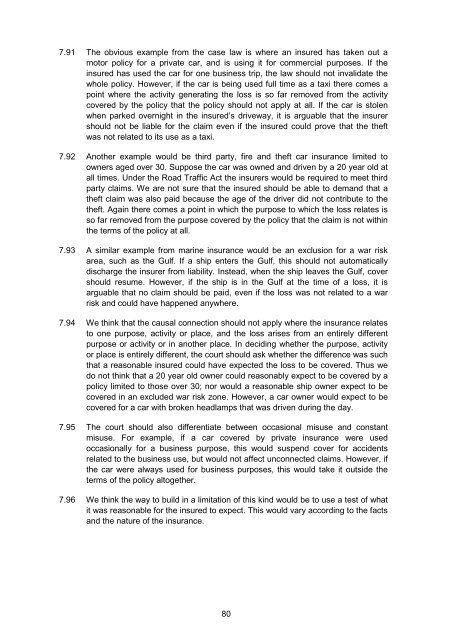Insurance Contract Law Issues Paper 2 Warranties - Law Commission
Insurance Contract Law Issues Paper 2 Warranties - Law Commission
Insurance Contract Law Issues Paper 2 Warranties - Law Commission
You also want an ePaper? Increase the reach of your titles
YUMPU automatically turns print PDFs into web optimized ePapers that Google loves.
7.91 The obvious example from the case law is where an insured has taken out a<br />
motor policy for a private car, and is using it for commercial purposes. If the<br />
insured has used the car for one business trip, the law should not invalidate the<br />
whole policy. However, if the car is being used full time as a taxi there comes a<br />
point where the activity generating the loss is so far removed from the activity<br />
covered by the policy that the policy should not apply at all. If the car is stolen<br />
when parked overnight in the insured’s driveway, it is arguable that the insurer<br />
should not be liable for the claim even if the insured could prove that the theft<br />
was not related to its use as a taxi.<br />
7.92 Another example would be third party, fire and theft car insurance limited to<br />
owners aged over 30. Suppose the car was owned and driven by a 20 year old at<br />
all times. Under the Road Traffic Act the insurers would be required to meet third<br />
party claims. We are not sure that the insured should be able to demand that a<br />
theft claim was also paid because the age of the driver did not contribute to the<br />
theft. Again there comes a point in which the purpose to which the loss relates is<br />
so far removed from the purpose covered by the policy that the claim is not within<br />
the terms of the policy at all.<br />
7.93 A similar example from marine insurance would be an exclusion for a war risk<br />
area, such as the Gulf. If a ship enters the Gulf, this should not automatically<br />
discharge the insurer from liability. Instead, when the ship leaves the Gulf, cover<br />
should resume. However, if the ship is in the Gulf at the time of a loss, it is<br />
arguable that no claim should be paid, even if the loss was not related to a war<br />
risk and could have happened anywhere.<br />
7.94 We think that the causal connection should not apply where the insurance relates<br />
to one purpose, activity or place, and the loss arises from an entirely different<br />
purpose or activity or in another place. In deciding whether the purpose, activity<br />
or place is entirely different, the court should ask whether the difference was such<br />
that a reasonable insured could have expected the loss to be covered. Thus we<br />
do not think that a 20 year old owner could reasonably expect to be covered by a<br />
policy limited to those over 30; nor would a reasonable ship owner expect to be<br />
covered in an excluded war risk zone. However, a car owner would expect to be<br />
covered for a car with broken headlamps that was driven during the day.<br />
7.95 The court should also differentiate between occasional misuse and constant<br />
misuse. For example, if a car covered by private insurance were used<br />
occasionally for a business purpose, this would suspend cover for accidents<br />
related to the business use, but would not affect unconnected claims. However, if<br />
the car were always used for business purposes, this would take it outside the<br />
terms of the policy altogether.<br />
7.96 We think the way to build in a limitation of this kind would be to use a test of what<br />
it was reasonable for the insured to expect. This would vary according to the facts<br />
and the nature of the insurance.<br />
80

















